This isn't a political blog, so somebody help me out with these details.
We're in an economic downswing; everyone's out of a job, so they're all going to college. Obama's talking about allocating resources toward education. Government-sponsored education. Like FAFSA.
Sending people to college is great. But my feeling is that college is not the way to go for everyone. There are some careers that are best learned
on the job. Like skilled trades, stuff like that. Even medical professions require practicum. I'd argue that 99% of the real learning occurs when you're actually doing the work.
Yeah, you learn stuff in the classroom, too, but it's more effective as a
supplement to on-the-job training.
That's why I'm proposing that government should allocate a portion of their college-sponsorship funds to approved business for the purpose of on-the-job apprenticeship. Paid apprenticeship. So the student can be earning money while learning a skill.
Here's the part that makes this idea different: the programs should be set up with
small businesses. Especially those which require skilled workers or employees with specialized knowledge. Examples could be acupunturists, sustainable agriculture, green building, drafting, producing, media, sales . . . the list goes on.
Obviously, there would have to be a system in place so that these business don't abuse the free money and cheap labor. They would have to really pull their weight with regard to education. In other words, they'd have to hire teachers/trainers and/or pay existing employees to act as trainers part of the time.
There should be
one-on-one mentorship opportunities. Like, you could be paired up with a successful entrepreneur or investor.
Unlike college, this program would shift focus away from "hard facts that you memorize" to the "soft skills" involved in making sales, connecting with clients and actually getting the job done. Sure, there would be stuff to learn too, but instead of being learned in a vaccuum, it would be concurrent with the hands-on job.





 taking a whiz?
taking a whiz?


